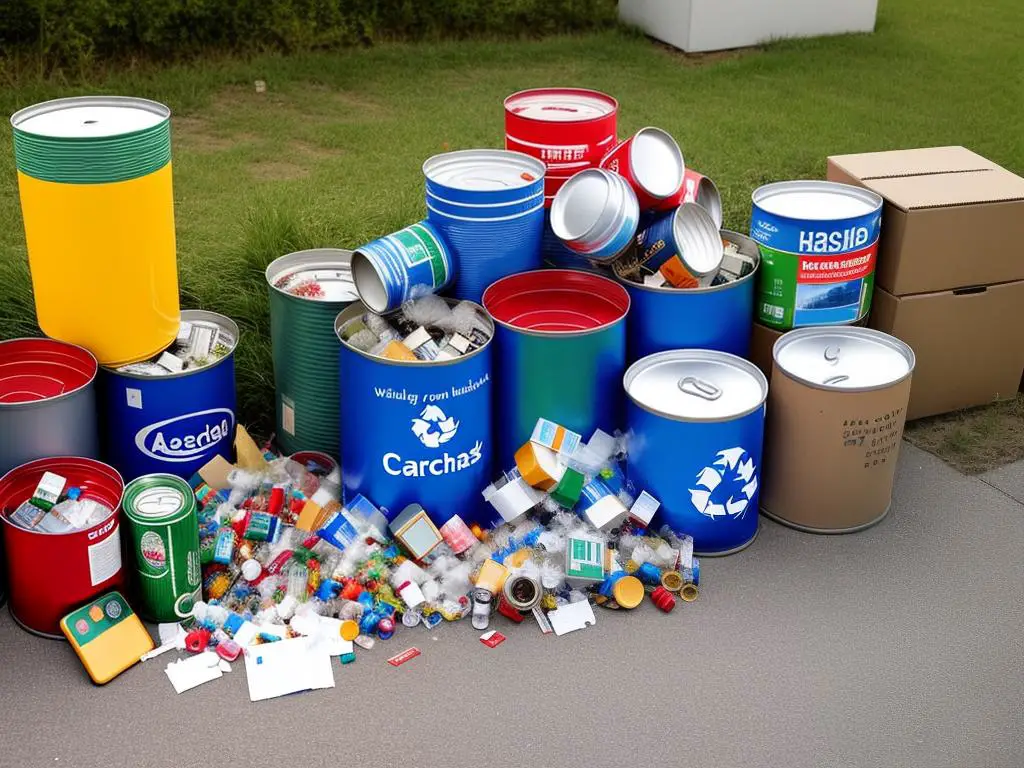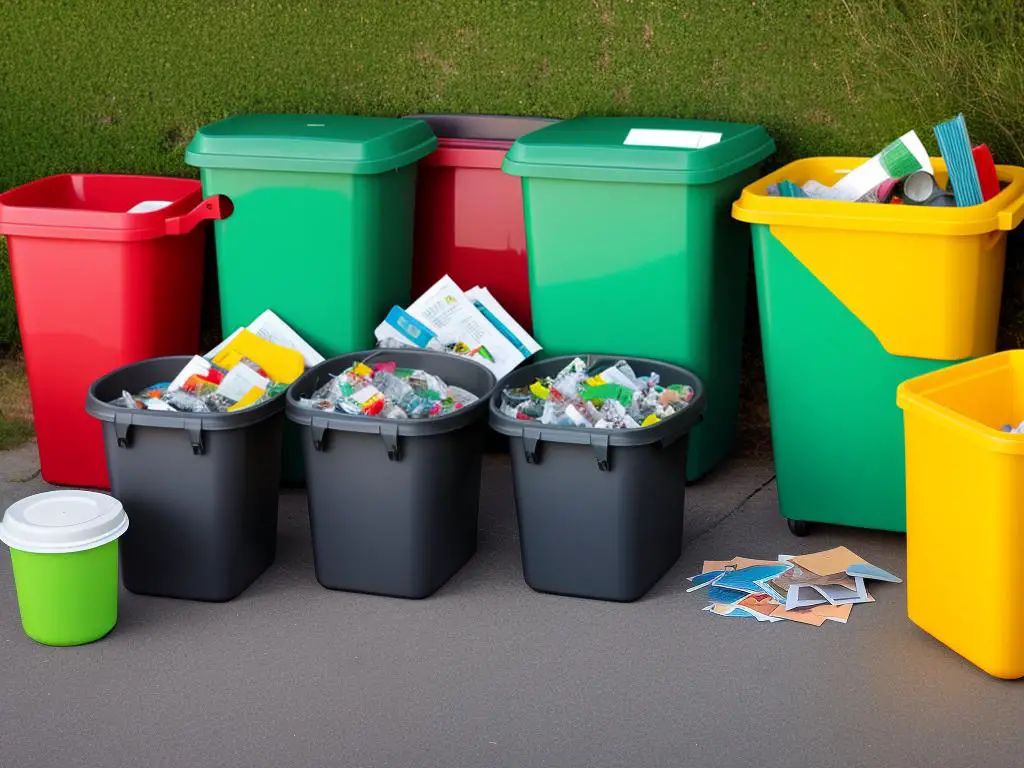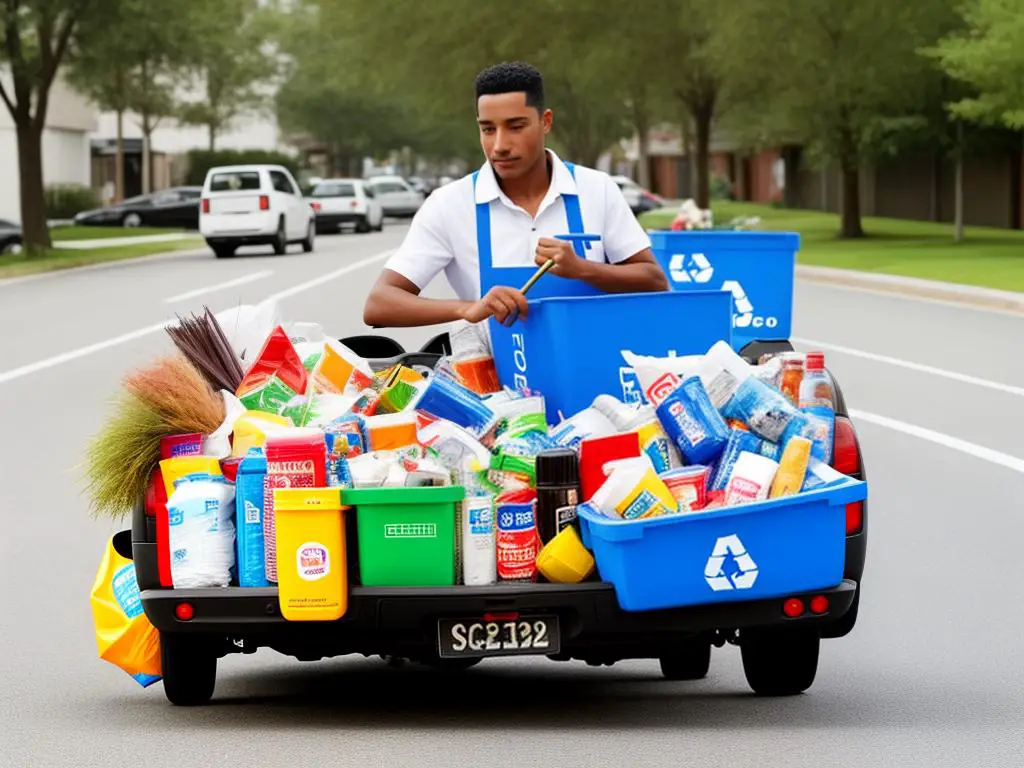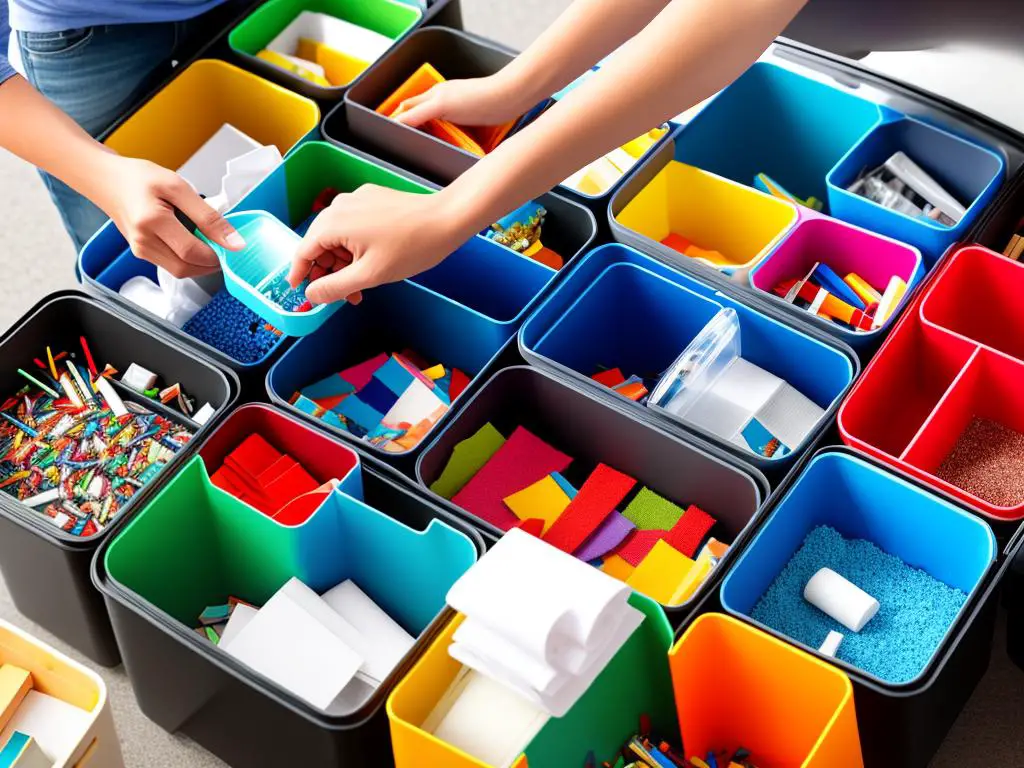With an ever-growing recognition of sustainable living and green practices, the facet of recycling not only just serves a significant benefit to our environment, but also posits a thriving realm of opportunity for monetary gain.
However, venturing into the profitable scope of recycling for cash requires a keen understanding of various elements, from knowing the recycling market and its fluctuating demands to diligently sorting and prepping your recyclable materials for optimal profit.
Profitable recycling also involves proactively locating potential buyers and astutely engaging them for favorable terms of sale, while adhering to the ethical, local, state, and federal regulations around the sale of recyclable materials. With that being said it is a best side gig for quick cash for people needing money.
This discourse aims to comprehensively equip you with insights that go beyond the basics and delve into lucrative aspects of recycling for quick cash in a sustainable, ethical, and legally compliant manner.
Understanding the Recycling Market
Understanding the Recycling Market: A Lucrative Route to Quick Cash?
The recycling market plays a substantial role in promoting sustainable growth, all while offering a potential avenue for earning some quick cash. A wide array of recyclable materials — from plastics to metals — hold considerable value.
However, the key to turning recyclable materials into a profitable venture hinges heavily on a myriad of market factors. These factors include location, current market conditions, and the type of recyclable materials. Here are some points for you to better navigate this eco-friendly market.
High Demand Recyclable Materials
Primarily, understanding the recycling market necessitates the knowledge of materials that are in high demand. Here are some of them:
- Aluminum: Arguably, the most sought-after recyclable material. Aluminum cans, in particular, are easy to collect and recycle.
- Cardboard: A high demand for cardboard and paper exists, especially corrugated cardboard that’s predominantly used in packaging.
- Plastics: PET plastic–typically seen in water bottles–and HDPE plastic–commonly used for detergent bottles or milk jugs– are two types of plastics with high recycling rates.
- Electronics: With electronic waste (e-waste) becoming a significant environmental concern, there’s a high need for recycling electronics. Desirable items include computers, television sets, mobile phones, and more.
Market Conditions and Pricing
Understanding the recycling market also means having your finger on the pulse of current market conditions. Recyclable material pricing fluctuates regularly due to supply and demand forces. Keeping track of these price variations will prove crucial if you aim to maximize your profits.
Demand is generally driven by the need for raw materials in manufacturing industries. If companies require more raw materials, demand for your recyclable materials will increase, often leading to price surges. Conversely, if demand decreases, likely due to a slowdown in manufacturing activities, prices can drop.
Different materials also yield various prices. For instance, aluminum and copper fetch higher prices in the recycling market than cardboards and some plastics, primarily due to their wider usages in several industries.
Location: A Crucial Determinant of Pricing in Recycling
The location where you’re selling recyclable materials will heavily impact the price you receive. The reason behind this disparity is transportation cost incurred by the recycling facility. If you live closer to the recycling facility, you’ll likely obtain a better price due to reduced transportation charges. Conversely, if the facility is far where recyclable items are collected, prices are often lower to compensate for the additional transport costs.
Conclusion: Turning Trash into Cash
Recycling for quick cash employs a basic understanding of the recycling market — an understanding of the types of materials in high demand, the influence of market conditions on pricing, and the role of location in pricing.
By learning how to optimize these factors, you’re not just contributing to the preservation of our environment, but you’re also potentially adding another income stream to your budget. In essence, you’re turning trash into cash!

Sorting and Preparing Recyclables
Introduction: Profitable recycling for quick cash
America is a land of plentiful resources, and every year, we generate millions of tons of recyclable waste. Turning in these recyclable materials can lead not only to a healthier environment but also to potential profits. By learning the system and discovering how to sort your recyclable materials for maximum profitability, you could add a small but significant source of income to your budget.
1. Understanding the value of recyclable materials
Not all recycling is created equal. Certain types of recyclable materials have higher value than others. Here are some of the most profitable recyclables:
- Metals: Metals such as aluminum (like soda cans) and copper are often the most valuable to recycle.
- Paper products and cardboard: Paper products and cardboard can be recycled for money, although they’re usually worth less than metals.
- Glass and certain types of plastic: Glass and certain types of plastic are also recyclable, but they usually have minimal value.
2. Sorting recyclable materials
To maximize your profits when recycling, it’s essential to separate your recyclable materials. Mixing recyclable materials can lead to contamination, which often results in the materials being sent to the landfill instead of being recycled. By separating your recyclables into different types, you can help ensure they are properly recycled and receive the most money for them.
To sort your recyclable materials, start by setting up separate bins for each type of material, such as metal, paper, plastic, and glass. Label each bin clearly and place them in easily accessible spots in your home to encourage use.
3. Preparing materials for recycling
Once you’ve sorted your recyclable materials, it’s time to prepare them for recycling. Here are a few tips:
- Rinse out containers: Recyclable containers should be empty and clean before being recycled. This not only helps prevent contamination, but it also makes your recyclables more valuable.
- Compact materials if possible: For certain recyclable materials, such as aluminum cans or plastic bottles, you can increase their value and reduce the space they take up by flattening or crushing them.
- Keep materials dry: Wet paper products can often not be recycled. It’s essential to keep your recyclables dry to ensure they’re accepted by recycling facilities.
4. Storing and transporting recyclables
After sorting and cleaning your recyclable materials, you’ll need to store them until you’re ready to take them to a recycling center.
- Store your recyclables: Store your recyclables in a cool, dry place to prevent any deterioration or damage.
- Transporting recyclables: When it’s time to take your recyclables to the nearest recycling center, ensure to transport them in a separate, labeled bag or container for each type of material.
Tip: Research local recycling centers
Before taking your materials to a recycling center, it’s smart to research local centers to find out which ones offer the best prices for the types of recyclables you have. Prices can vary widely from one center to another.
Remember, recycling isn’t just a way to make extra money—it’s a necessary step toward maintaining a healthy environment. By taking the time to properly sort, prepare, and recycle your materials, you’re making a positive impact on the world around you.

Finding and Engaging Buyers
Introduction: Profitable Recycling for Quick Cash
The era of environmental awareness and sustainability has created an emerging market for recyclable materials. Selling these objects doesn’t just help protect the planet – it can be a legitimate way to earn fast cash.
Successfully trading these materials requires you to correctly identify potential buyers, approach them effectively, negotiate profitable prices, and establish lasting relationships. Below are several steps you can use to navigate this process effectively.
Identifying Potential Buyers
The first part of the selling process involves finding those interested in purchasing your recyclable materials.
- Check Online Resources: The internet is an invaluable resource for this step. Websites and internet marketplaces like eBay, Craigslist, and Freecycle offer platforms where you can locate buyers for a variety of recyclable materials.
- Regularly Visit Recycling Centers: These sites likely have connections with various recyclable buyers and could introduce you to them directly. They also might purchase your materials directly.
- Attend Recycling Industry Events: These can include conferences, workshops, and other communal gatherings where you will meet potential buyers at the trade events where they typically converge.
How to Approach Potential Buyers
After identifying potential buyers, your next step is to approach them in a way that will generate interest in your materials.
- Be Proactive: Don’t wait for buyers to come to you – reach out to them first. If you’ve found potential buyers online, send them a friendly message about your materials.
- Offer Quality Products: Ensure the recyclable materials you offer are clean and sorted correctly. High quality generates considerable interest from potential buyers and awakens a desire to do business with you.
Negotiating Prices
Once you’ve initially contacted a buyer and they express interest, you’ll need to negotiate a mutually beneficial price for your recyclables.
- Research Market Prices: Before entering any negotiations, you must be well-informed about how much your recyclable materials are going for on the existing market. This will help you anchor your prices realistically and optimally.
- Stand Your Ground: Though you want to maintain a positive relationship with your buyer, you must also be willing to advocate for your desired price. Never settle for a price that’s too low.
Establishing Ongoing Relationships
Maintaining long-term relations with your buyers is an important part of creating a thriving recycling business.
- Maintain Communication: Regularly check in with your buyers to know what materials they’re currently interested in and to keep them informed about what you have available.
- Provide Excellent Service: When you promise delivery or availability of certain materials, ensure that you follow through. Unreliable sellers often lose buyers.
- Show Appreciation: Remember to show gratitude to your buyers for their business. Simple gestures of appreciation can go a long way in maintaining their loyalty.

Regulations and Best Practices
Understanding Regulations: The Blueprint to Profitable Recycling
One of the vital steps in profitable recycling for quick cash involves complying with local, state, and federal regulations related to recyclable materials sale. Here’s how to go about it:
- Understand Your Local Regulations: Firstly, acquaint yourself with the local recycling regulations. Different cities or counties might have different rules for recycling. Check your city’s or county’s official website for information on their recycling program or reach out to the local waste management organization.
- Stay Informed About State Laws: Each state in the U.S. has different recycling laws. For instance, some states have ‘Bottle Bill’ laws which allow consumers to redeem deposits on bottles and cans. Others have recycling legislation in place to manage electronic waste. The ‘National Conference of State Legislatures’ website will help you understand your specific state’s recycling laws.
- Know the Federal Regulations: Federal laws play more of an oversight role, guiding states to form their legislation and monitor recycling programs. The Resource Conservation and Recovery Act (RCRA) provides regulations on the safe disposal of hazardous waste. You might not directly encounter federal regulations in your recycling venture, but understanding them can offer better context on recycling as a whole.
Recycling Best Practices: Ethics and Sustainability Matters
Recycling profitably doesn’t mean throwing ethical and sustainable practices out the window. How can you ensure you’re recycling right?
- Know What is Recyclable: Not everything can be recycled. Make sure you’re familiar with the items you can recycle in your locality, so you avoid sending non-recyclable goods to recycling facilities, which can cause issues in the recycling process.
- Clean Your Recyclables: Making a habit of cleaning your recyclables not only makes them more valuable but also reduces contamination in recycling facilities.
- Don’t Recycle Dangerous Materials: Some materials, such as batteries or hazardous household waste, need special handling. They can be harmful if put in traditional recycling bins. Always follow local regulations when recycling these items.
- Reuse Before Recycling: If an item is still functional, consider donation or reselling. If it’s broken, see if it can be repaired before recycling it. Not only is this usually the most sustainable option, but it also might be more profitable.
- Stay Updated on Recycling Science: The world of recycling is constantly improving and evolving thanks to scientific advancements. Following the latest research can help you find new ways to recycle more efficiently and profitably.
In conclusion, profitable recycling for quick cash is more than just collecting and selling recyclables. It’s about abiding by the rules, practicing ethical recycling, and making an effort to understand and improve the recycling process.

This knowledge aids in transforming simple recycling habits into a feasible money-making endeavor, while also contributing positively to our environment. The real key to success in this area is a well-rounded grasp of the industry: understanding market trends, correctly sorting and preparing recyclables, effectively engaging with potential buyers, and respecting all rules and regulations surrounding the process.
By adhering to these practices, profitability in recycling becomes no distant dream but an accessible reality, providing yet another significant reason to support and participate in sustainable habits that aid in preserving our planet.



Leave a Reply